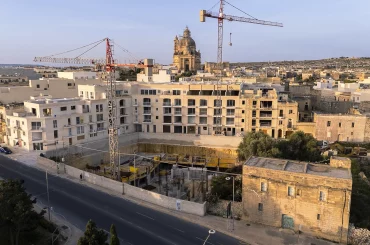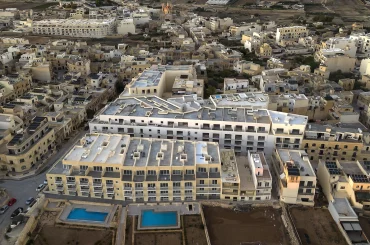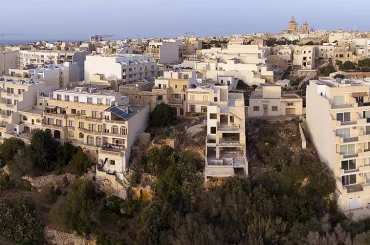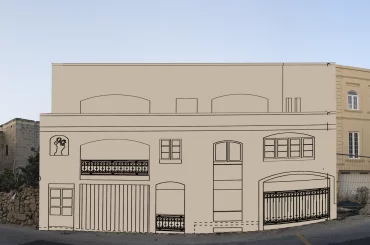In a dramatic move last Thursday at the Environmental and Planning Appeals Tribunal, which hears legal appeals against development permits, a company of Joseph Portelli and his Gozitan partners requested the recusal of the tribunal’s chairperson on the morning it was due to deliver judgement on appeals against two large blocks of flats. The unusual move suggests nervousness on the part of the developers after the tribunal in recent months revoked two development permits that had been granted to Portelli and his associates.
A few hours later the tribunal hit back in a strongly-worded decree, stating that it (the tribunal) has its “doubts regarding the genuineness of the request for recusal at this stage, only four hours before the reading of the decision [judgement].”
The judgements that were set to be delivered were over appeals against two permits in two sprawling clusters of flats in Sannat and Qala. Appeals against the permits were filed by the NGOs Moviment Graffitti and Din L-Art Helwa, as well as the Qala Local Council.
Exception of recusal cannot be invoked arbitrarily by one of the parties that may feel more comfortable or protected in front of one member of the judiciary than another.
Planning tribunal
These sprawling developments are among the largest – if not the largest – residential projects Gozo has ever seen. In both projects, this website had revealed that the various planning applications put under different applicants all belonged to a company called Excel Investments Limited, whose majority shareholder is Joseph Portelli.

Putting large developments in different applications put in incrementally may undermine the planning process. For example, if the Qala project had been put in as a single application, it would have exceeded the gross floor area that would have triggered an Environment Impact Assessment screening and possibly a fully-fledged EIA.
The Qala Local Council last week said that “the developer files applications in a piecemeal fashion to make life more difficult for us.”

It also denounced the tribunal for not suspending the works during the appeal – in the two years it has already taken to hear the appeal, construction of the block of flats is now more than half-complete.
“Our right to appeal is being rendered ineffective,” the council lamented.
Last Thursday’s legal applications stated that J Portelli Projects had “interests” in the Qala and Sannat developments, as well as a large project in Hal Balzan – development permit for the Balzan project, called Park Lane, was revoked last week.
The argument was then made that the chairperson of the tribunal, Joseph Borg, had been an objector in the application for the development of the Balzan project – consisting of a shopping centre and 88 flats – and, due to this, he was asked to recuse himself from all pending cases in front of the tribunal in which J Portelli Projects has a stake.
In its decree a few hours later, the tribunal sharply pointed out that J Portelli Projects, which belongs to Joseph Portelli, did not appear in any of the documents pertaining to any of the developments for which judgement was set to be delivered that day, as well as the other developments mentioned in the legal application, which was signed by the lawyer Ian Stafrace. (The application for the Balzan development was put in by Clifton Cassar on behalf of CF Developers Limited, the application for a block of 54 flats at Ta Zejta was put in by Mark Agius, and the two approved developments for which judgement in the appeal was due to be delivered were put in by Mark Agius and Eric Saliba.)
The tribunal then added that the chairperson, Joseph Borg, had objected to the project in Balzan in his personal capacity, and that the legal application was intended to gag Borg from objecting to the Balzan development. It also pointed out that the Balzan development application is still pending – the tribunal revoked the permit and sent it back to the Planning Authority to consider it afresh – and that the legal application was intended “to impede public consultation over that project [in Balzan].”
The tribunal also took issue at the reference to the block of flats at Ta Zejta, where a permit for 54 flats was revoked last December. In the legal application, Portelli and partners said they had reservations of a “constitutional nature” about the revocation of that permit. The tribunal hit back by saying that the applicants had never raised such reservations on the tribunal's composition during the proceedings themselves. it added that expressing reservations at this stage, in an appeal on a separate development, was intended “to intimidate the tribunal” during the hearing of the appeal and the eventual decision.
Another point made by the tribunal in its decree is that the exception or request for recusal “cannot be invoked arbitrarily by one of the parties that may feel more comfortable or protected in front of one member of the judiciary than another.”
Yet the chairperson, Joseph Borg, still decided to recuse himself from all legal appeals pending in front of the tribunal in which J Portelli Projects has a stake. This website is aware of two such appeals in which judgements were set to be delivered last Thursday – one of the blocks in the cluster of developments at Ta Sannat, and another in the sprawling development at Ta Ghar Boffa.

The chairperson’s decision to recuse himself just before delivery of judgement is possibly without precedent. Normally, any requests for recusal are either put in and considered at the beginning of the proceedings, or at the stage when any conflict of interest becomes manifest. In this case, as the tribunal pointed out, Borg had spoken against the Balzan development in a public meeting last June.
The entire case may now have to be heard afresh after Borg is substituted, although the tribunal can expedite the process.
In any case, construction of the buildings under appeal in Qala is more than half-completed, and that of Sannat is complete.

The tribunal rarely suspends works while an appeal is heard, and this is one of the elements that has led to a widespread loss of confidence in the planning tribunal. Most people – NGOs particularly – feel that once construction is completed, their appeal becomes futile.
Did you know that the Qala land was originally put in a medieval foundation set up to raise money for pious deeds? Read a timeline of events.
Subscribe to the newsletter to stay on the loop on significant investigations by clicking here, or contribute to this website's Planning Emergency exposés by clicking here.




